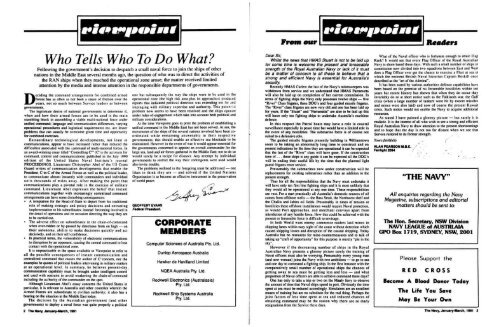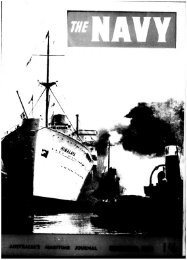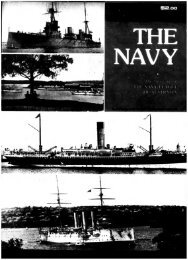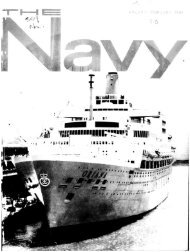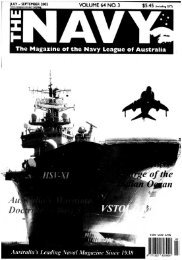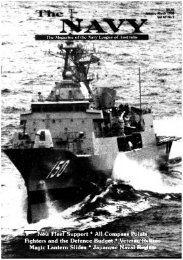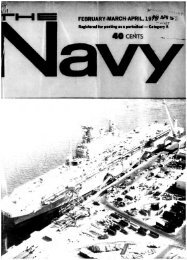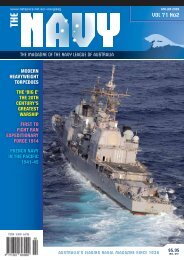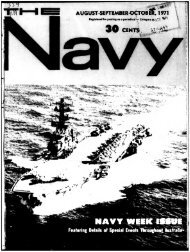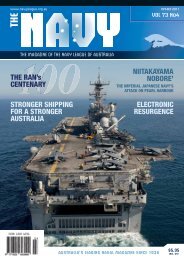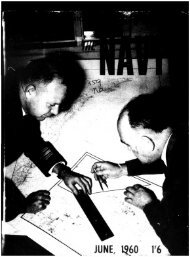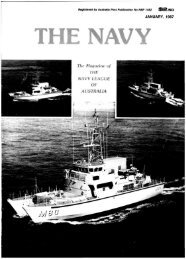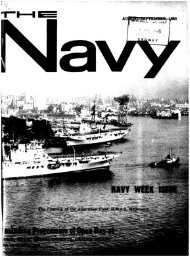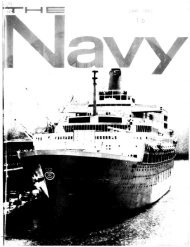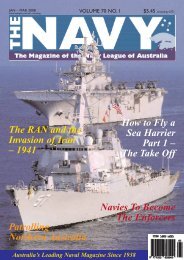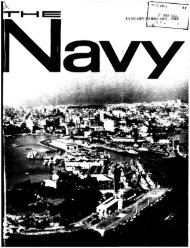Jan and Apr 1991 - Navy League of Australia
Jan and Apr 1991 - Navy League of Australia
Jan and Apr 1991 - Navy League of Australia
You also want an ePaper? Increase the reach of your titles
YUMPU automatically turns print PDFs into web optimized ePapers that Google loves.
D<br />
f'##»f~f#0####<br />
Who Tells Who To Do What?<br />
Following the government's decision to despatch a small naval force to join the ships <strong>of</strong> other<br />
nations in the Middle East several months ago, the question <strong>of</strong> who was to direct the activities <strong>of</strong><br />
the RAN ships when they reached the operational zone arose; the matter received limited<br />
attention by the media <strong>and</strong> intense attention in the responsible departments <strong>of</strong> governments.<br />
eciding the comm<strong>and</strong> arrangements for combined armed<br />
forces has as <strong>of</strong>ten as not been a cause <strong>of</strong> friction over the<br />
years, not so much between Service leaders as between<br />
governments.<br />
The legitimate desire <strong>of</strong> national governments to determine if,<br />
when <strong>and</strong> how their armed forces are to be used is the mam<br />
stumbling block in assembling a viable multi-national force under<br />
unified comm<strong>and</strong>; language <strong>and</strong> communication differences, varying<br />
operational procedures <strong>and</strong> logistical requirements etc. arc lesser<br />
problems that can usually be overcome given time <strong>and</strong> opportunity<br />
for combined exercises.<br />
Extraordinary technological developments, not least in<br />
communications, appear to have increased rather ihan reduced the<br />
difficulties associated with the -.omm<strong>and</strong> <strong>of</strong> multi-national forces. In<br />
an award-winning essay titled "Controlling C" (C is the acronym for<br />
comm<strong>and</strong>, control <strong>and</strong> communications) published in the July 1990<br />
edition <strong>of</strong> the United States Naval Institute's journal<br />
PROCEEDINGS. Lieutenant Christopher Abel <strong>of</strong> the liS Coast<br />
Guard writes <strong>of</strong> communication developments that enable the<br />
President C-in-C <strong>of</strong> the Armed Forces as well as the political leader,<br />
to communicate almost instantly with comm<strong>and</strong>ers <strong>and</strong> individual<br />
units thous<strong>and</strong>s <strong>of</strong> miles away. After making the point that<br />
communications play a pivotal role in the exercise <strong>of</strong> military<br />
comm<strong>and</strong>. Lieutenant Abel expresses the belief that instant<br />
communications together with increasingly centralized comm<strong>and</strong><br />
arrangements can have some disturbing consequences:<br />
• A temptation for the Head-<strong>of</strong>-State to depart from his traditional<br />
role <strong>of</strong> making strategic <strong>and</strong> policy decisions <strong>and</strong> entrusting<br />
implementation to his subordinates: instead becoming involved in<br />
the detail <strong>of</strong> operations <strong>and</strong> on occasion directing the way they are<br />
to be earned out.<br />
• The adverse effect on subordinates in the chain-<strong>of</strong>-comm<strong>and</strong><br />
when over-ridden or by-passed by directions from on high — on<br />
their autonomy, ability to make decisions quickly <strong>and</strong> act<br />
decisively, <strong>and</strong> on their self-confidence.<br />
• In practical terms, the vulnerability <strong>of</strong> electronic communications<br />
to disruption by an opponent, causing the central comm<strong>and</strong> to lose<br />
contact with the operational zone.<br />
It is impracticable in the space available to Viewpoint to refer to<br />
all the possible consequences <strong>of</strong> instant communication <strong>and</strong><br />
centralized comm<strong>and</strong> that causes the author <strong>of</strong> C concern, nor the<br />
examples he quotes <strong>of</strong> political leaders intervening in military matters<br />
at an operational level. In summary, he believes present-day,<br />
communication capability must be brought under intelligent control<br />
<strong>and</strong> used with restraint to avoid weakening the chain-<strong>of</strong>-comm<strong>and</strong><br />
including the aurhority <strong>of</strong> the comm<strong>and</strong>er on the spot.<br />
Although Lieutenant Abel's essay concerns the United States in<br />
particular, it is relevant to <strong>Australia</strong> <strong>and</strong> other countries wherein the<br />
Armed Forces are subordinate to civilian authority; it also has a<br />
bearing on the situation in the Middle East today.<br />
The decision by the <strong>Australia</strong>n government (<strong>and</strong> other<br />
governments) to deploy a naval force was quite properly a political<br />
2 Th«N«vy, J»nu«ryM»rch. <strong>1991</strong><br />
one but subsequently the way the ships were to be used in the<br />
operational zone (the high risk area plus its approaches) produced<br />
reports that indicated political direction was extending too far <strong>and</strong><br />
impinging with military expertise <strong>and</strong> authority. This potential<br />
problem now seems to have been resolved <strong>and</strong> the ships operate<br />
under rules-<strong>of</strong>-engagement which take into account both political <strong>and</strong><br />
military considerations.<br />
At the time Viewpoint goes to print the problem <strong>of</strong> establishing a<br />
unified comm<strong>and</strong> in the Middle East has not been solved. At sea, the<br />
movements <strong>of</strong> the ships <strong>of</strong> the several nations involved have been coordinatcd<br />
while remaining answerable to their respective<br />
governments; this should enable an effective sea blockade to be<br />
maintained. However in the event <strong>of</strong> war it would appear essential for<br />
the governments concerned to appoint an overall comm<strong>and</strong>er for the<br />
large sea, l<strong>and</strong> <strong>and</strong> air forces gathered in the Middle East; not to do so<br />
would surely be a recipe for disaster. Any attempt by individual<br />
governments to restrict the way their contingents were used would<br />
also invite trouble-<br />
The problems outlined in the foregoing must be addressed — one<br />
likes to think they are — <strong>and</strong> solved if the United Nations<br />
Organisation is to become an effective instrument in the preservation<br />
<strong>of</strong> world peace.<br />
GEOFFERY EVANS<br />
Federal President.<br />


